'Unmasking Gender Ideology' panel warns 'women are going to lose' rights if trans ideologues win
CP event tackles dangers of transgenderism, how the Church should respond
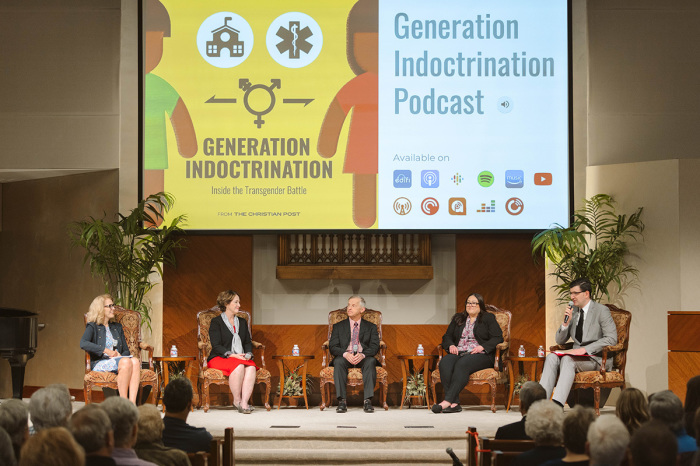
DALLAS, Texas — What is a human being? And what does it mean to be a human being?
Those were the central questions considered at The Christian Post’s conference, "Unmasking Gender Ideology: Protecting Children, Confronting Transgenderism," where several professionals from various fields with experience fighting gender ideology came together to share their insights.
A crowd of more than 170 people attended the event co-sponsored by First Baptist Dallas on March 23 for the conference, which tackled a number of topics, including the dangers of gender ideology and its impact on the Church, the indoctrination and medical abuse of children in the name of “gender-affirming care,” and the plight of incarcerated women who are required to share prison cells with men due to gender self-ID laws.
The event was hosted by CP's award-winning social commentator and podcaster Brandon Showalter, who underscored the urgency of facing gender ideology in the Church.
Showalter pointed to the very origins of mankind in Genesis 1:27 — where God made both man and woman in His image — as an illustration of transgender ideology’s “grave assault” on the Gospel itself.
“These are not secondary or tertiary doctrinal matters,” said Showalter. “They are primary.”
Get your free book 'Exposing the Gender Lie' here
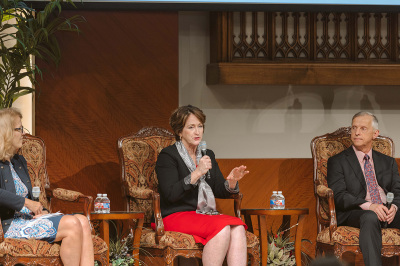
Mary Rice Hasson, J.D., a fellow at the Ethics and Public Policy Center, was among the speakers in the event’s first panel and warned this ideology is a “global event” that is shaping our world from language to the fields of law and healthcare.
Calling the movement a “danger to women,” Hasson pointed to the decline of religion as playing a key factor in the spread of the trans movement.
“All of sudden, you had a culture that was still looking for meaning but didn’t have an answer and was much more willing to believe," said Hasson. “So now we’re facing a situation where a basic concept like sex — we know what it is, it’s the difference between male and female, it’s a biological term — sex in the law is being redefined to mean gender identity.”
Since the “coming out” of former Olympic gold medalist Bruce Jenner as Caitlyn Jenner in 2015, transgenderism has grown exponentially, particularly in the West.
According to UCLA’s Williams Institute, the number of young people who identify as trans has doubled just in the last few years, while one in five people who identify as trans are between 13 to 17 years old.
And because of the subjectivity of gender identity, Hasson said the transgender movement poses a dire threat to women in particular.
“Gender identity is a feeling,” she explained. “It’s completely subjective — can’t test for it, can’t prove it, it’s got to be declared.
“When you make that a legal category, what you’re doing is you’re ensuring that women, in particular, are going to lose all those rights that go with sex discrimination laws.”
That threat toward women might be most acute, perhaps surprisingly, in the American prison system. In trans-affirming states like California, biological men — including serial sex offenders — are allowed to transfer to women’s facilities.
Amie Ichikawa, who served five years in a California state prison and now heads the Woman II Woman prison advocacy group, told the panel that while prison was “not wonderful” prior to the 2021 passage of California’s Senate Bill 132, which allowed incarcerated men to be housed with women if they self-identified as women, things have rapidly gone downhill.
Ichikawa told the story of one serial rapist who, before the passage of SB132, mutilated himself and declared himself to be a woman for the sole purpose of being housed with female inmates.
Along with bringing distinctly male politicking — including distinctions of race, gang affiliation and crime level — into the women’s facility, this inmate was serving time for the violent rape of a mother and daughter.
“At one point, he asked the president of the women's advisory council if he could get a job in the electrical shop,” she recounted. “Years later, we found out he electrocuted his victims.”
Now, said Ichikawa, the implementation of SB132 has changed culture radically: she has personally heard from some 200 women who “need to talk to someone,” so she provided her personal cell phone number for them to contact.
Ichikawa said she and her formerly incarcerated partners are “dedicated to holding the line and making sure we don’t abandon our sisters inside.”
So how did we get here?
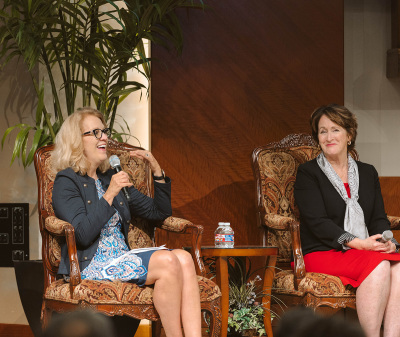
Jennifer Lahl, who spent 20 years in clinical nursing and is the founder and president of the Center for Bioethics and Culture, said the shift has taken place even as the medical profession has been completely transformed.
Whereas traditionally the profession involved a relationship between doctors and patients, now in the Google era, doctors have become “healthcare providers” and patients are now “clients” or customers.”
“Now we’ve become consumers of medicine,” said Lahl. “I walk in, I show up, I say, ‘Doctor, I’ve done the Google search, here’s what I want, here’s what I have. ...”
Another factor, according to Lahl, is that medical ethics is no longer a required course in med school.
“Medicine — like academics, like the media, like the cultural elites — has been captured,” she said.
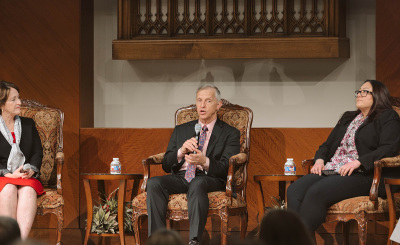
Much of that has occurred in the name of “gender-affirming interventions,” or a pattern of what panelist Dr. Andre Van Mol described as “junk science” pushing out decades-old research.
“There's decades of literature showing overwhelming probability in a gender dysphoric minor of underlying mental health problems, of adverse childhood experiences, bad family dynamics and a way over-representation of autism spectrum dysphoria, and that these all predate the gender dysphoria,” Van Mol explained.
"There's always a more honest answer to gender dysphoria, gender confusion in a minor than chemical sterilization and surgical mutilation," he added. "What they need is to address those underlying issues, and it comes with mental health evaluation and treatment.”
According to recent data, the number of minors in America receiving a diagnosis of gender dysphoria tripled from 2017 to 2021, with more than 42,000 receiving the diagnosis in 2021. On the social media platform TikTok, which is especially popular among younger people, the hashtag “trans” has logged 50.2 billion views, nearly doubling within the space of a year.
More European nations, he added, are turning away from this “junk science” and instead telling minors who are experiencing gender dysphoria to undergo comprehensive psychological evaluation and therapy.
This approach, said Van Mol, is a more holistic method of addressing what tends to be a deeply complex condition.
“There's always a more honest answer to gender dysphoria or confusion in a minor than chemical sterilization and mutilation,” he said. “What they need is to address those underlying issues.”
Given the multifaceted dynamic of transgenderism, how can the Church respond in a way that’s both truthful and helpful?
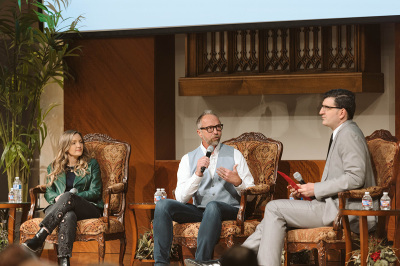
Jeff Myers, Ph.D., the president of Summit Ministries and co-author of a recent e-book with Showalter, titled Exposing The Gender Lie, said Christians must first acknowledge the urgency of the issue and the threat it poses.
“We realized we can't be silent on the issue of gender ideology because it is an attack on the very idea of truth itself,” said Myers.
He said he’s “very concerned” about transgenderism and pointed to some 6,500 catalogued biological differences between males and females.
“The idea that you can be a boy and become a girl is a lie; it is a lie about biology and it is a lie about personhood,” he said.
Myers pointed to the teaching of the postmodern view that words are reality — a teaching that stretches back nearly three decades, when university students were being taught that no objective reality exists, only “knowable perceptions.”
“So instead of saying people should seek the truth, now people say you should ‘speak your truth,” he explained. “So if words have no relation to reality, then words like ‘male’ and ‘female’ don’t matter anymore.”
That application, said Myers, underpins the entire ideology of transgenderism, which “twists language” to threaten the livelihoods of those whose very job is to communicate facts and data.
“You’re a journalist, you’ll get fired if you don’t do this,” he said. “If you refer to biological men who identify as women as transgender women, you must use that terminology.
“If you’re in the corporate world and don’t do it, you’ll be fired.”
Panelist Julia Jeffress Sadler, a licensed professional counselor and bestselling author of Pray Big Things, said that mindset is why Christians must be equipped with God’s Word in order to respond effectively.
“I personally do not see a ton of kids who have really strong faith and upbringing and are assured of their salvation personally struggling with transgender, that’s not what I see,” she said. “But they don’t know how to defend the truth; they don't know how to use the Bible to explain the reality that we’re male and female.”
Lahl echoed that sentiment, stating her conviction — and perhaps summing up the battle itself — that transgenderism isn’t simply a political or cultural attack but one that is satanic in its origins.
“I don't believe in transgenderism,” she said. “I think that’s a lie from the devil.”
Ian M. Giatti is a reporter for The Christian Post. He can be reached at: [email protected].
































